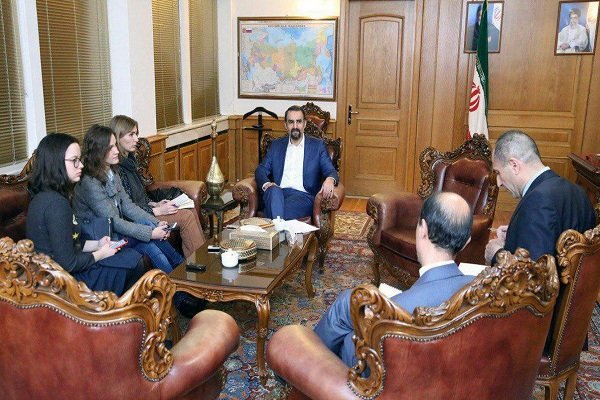The text of the interview of Iran’s Ambassador to Russia Mehdi Sanei with Rosia Sudenya is presented below. The interview was widely quoted by Russian news media.
What is your opinion about the current level of cooperation between Iran and Russia? can it be said that last year (2017) was a year in which strategic cooperation between Tehran and Moscow leaped forward?
Our political relations are developing excellently. Our cooperation at the regional and international levels have also developed very well. Both countries in have almost triumphed against terrorism in Syria. We worked together within the Astana framework and created zones of reduction of tensions which were a great achievement.
Iranian President visit Russia last year. Putin visited Iran one time. The two countries’ foreign ministers met last year. The two countries’ officials have spoken telephone many times. Last year, there were many exchanges of delegations between the two countries. Iranian Parliament Speaker visited Russia two times. For this reason, the year 2017 can be called a year without any reference in the bilateral relations between Tehran and Moscow.
However, I believe that the bilateral economic-business relations have grown at a modest pace. Last year, economic relations between the two countries grew less as compared to 2016. The exchange of goods between the two countries grew by 70% in 2016, excluding technical and military cooperation. This occurred after all the necessary diplomatic steps took place.
All relevant documents have been signed and all necessary requirements observed. There are also many government projects awaiting execution. This is due to the slow administrative bureaucracy that exists in both countries. On the other hand, this could be due to weak presence of our private sector and the weak interaction between the private sector of the two countries. The private sector needs to be more active. I hope that as government projects are implemented and private sector becomes more active, we will witness further development of bilateral economic relations in the future.
All in all, our officials are expressing their satisfaction with the way bilateral relations are developing. They believe that relations between Iran-Russia relations will pave the way for peace and stability in the region.
St. Petersburg’s economic summit is a good opportunity for the development of bilateral relations. Will Iranian delegations visit the summit and at what level?
Iran participated in the economic conference in St Petersburg for two years at an excellent level. I think that Iran will also attend this event this year. We have received invitation. I would like to add that we are looking to hosting a conference on the topic of the Southern Economic Summit in one of the southern cities of Russia, in collaboration with the Russians.
St. Petersburg conference and the economic summit of the East already take place. A conference takes place in Arkhangelsk. The southern summit can unite Russia with Iran and the Gulf states, India and Turkey. We have raised this plan with the Russians and we are working on it.
Will this conference be held this year?
No, I don’t think so. The Iran and Russia conference could be held in the first half of current year. We are working on it. I hope that this conference could be the basis of an international conference.
The situation in Syria has become extremely tense due to the Turkish operations in the northern part of the country. Wouldn’t the Turkish actions against the Kurds cause further inflame the Syrian problem? What is Iran’s stance on this issue?
I would like to say that the Congress of Syrian National Dialogue held in Sochi was a very good event in its own right. Representatives of various parties, tribes, and religions in Syria participated in this congress. In my opinion, this is a big step towards a political resolution of the Syrian crisis, while we see little movement in the Geneva talks. That is why the agreements reached during the congress and the documents that were approved are very important.
The Astana process had certain goals that included creating zones of reduction of tensions, which were create. After that, Sochi meeting was held. I think there were no realistic views at the Geneva meetings. Naturally, that is why there have been no big gains. We hope that the experience gained with the help of the Astana framework and the Sochi Congress will help solve this problem.
Concerning Afrin, in line with the United Nations Charter and international law, Islamic Republic of Iran has called for the preservation of the territorial integrity of Syria. Iran believes that any action and military presence in Syria should be carried out in coordination with the Syrian Arab Republic government.
Iran, Russia and Turkey have a good experience in the tripartite framework in the Astana process. For this reason, if these three countries have concerns, it is better to address these concerns within the framework of the trilateral Astana process, because a military solution makes it harder to solve the problem.
What is the status of joint Russian-Iranian cooperation in Syria?
Officials of the two countries are engaged in serious consultations. The Foreign Ministry has heldd several meetings in this regard in recent months, the Foreign Ministers of the two countries have also met to discuss this matter. Russian President’s special envoy [for Syria] Alexander Lavrentiev has traveled to Iran several times. He has met and talked with Iranian officials on this matter. For this reason, I believe that the achievements we made last year are the result of close and permanent cooperation between the political and military officials of the two countries. A recent quartet between Iran, Russia, Syria and Iraq was held in Baghdad.
US President Donald Trump has repeatedly said that if JCPOA is not renegotiated, US will exit the deal and has called for the deal to be reviewed. How does Iran assess its requests to other parties about the nuclear deal?
JCPOA is an international agreement. This is not a bilateral agreement. I would like to emphasize its international aspect. It took a long time to reach this agreement. JCPOA is the result of a long process of negotiations between Iran and the major superpowers and the permanent members of the United Nations Security Council. If JCPOA is questioned, this indicates, first of all, that, unfortunately Americans are still pursuing unilateralist viewpoint in resolving of various issues. Of course, this would fail. Of course this is a bad experience. As Russian Foreign Minister Sergei Lavrov has said, if JCPOA is questioned, what other method can one trust to solve various problems? If the president of one of these countries is changed, and in line with this change, the existing agreements will change, then there will be lawlessness.
Of course, Iran will try to cooperate with Russia and China, as well as with European countries, and will strive to maintain JCPOA. Even if JCPOA is violated, Iran will also have various scenarios of actions. At the same time, I must add that Iranian officials are always grateful to their Russian colleagues for their very true and fair position regarding JCPOA.
What are Iran’s scenarios? One of the issues raised in Iran is that if JPOCA is violated then Tehran can increase the number of centrifuges to previous level. What will Iran respond to if the United States takes action?
Of course, Iran will respond.
Iran’s concrete response measures will not be coordinated with its partners, for example, with Russia?
We always consult with Russia. Iran has informed Russia about its possible scenarios.
What are the joint projects with Russia in the field of oil and gas for this year (2018)? In particular, at what level is Gazprom’s project to produce “liquefied natural gas” (LNG) in Iran?
Last year, it was a good year for the development of bilateral energy relations. It witnessed considerable growth. A common understanding was reached between Russian oil and gas companies and the Iranian Oil Ministry. I must emphasize that the six major Russian oil and gas companies have a mutual understanding on MoUs. Some of them have presented their research results. I hope that all of this will pave the way for signing contracts in 2018. The Iranian side believes that the implementation of some of these contracts will begin in the first half of 2018. These companies are studying oil wells, but some of them are closer to signing agreement. For example, “Rosneft” is going ahead very well. Gazprom is in serious negotiations about LNG. Zarubezhneft has signed a pre-contract. Gazprom Oil also has good interactions with the Iranian side. Lukoil is also in high-level talks with Iranian parties.
Will Gazprom Neft agreement on natural gas be signed in the first half of the year?
The Iranian side is optimistic this will happen. I want the Russians companies to hurry up and sign the relevant agreements. The progress of companies such as Rosneft, Gazprom Oil and the Iranian side is noteworthy. I am very hopeful that contracts will be signed between these companies and Iranian parties in 2018. In terms of volume of investments, these values will be specified in the contracts.
Has Russia purchased oil from Iran this year in the oil-for-product deal? What amount and at what price?
We have no contract named as “Oil for product”. The correct name is contract for purchasing oil. It is written in the agreement that 50% of the proceeds from oil sales will be spent on joint projects. Another part of the money will be deposited with the Central Bank of Iran. From this perspective, 2017 was a good year, because the contract was executed and I hope very much that its implementation will continue in 2018. This agremement has special importance. On the one hand, it will bring our energy cooperation closer, and on the other hand, it will help solve one of the most important problems in Iran-Russia relations, the problem of lack of financial resources. The implementation of this agreement will help to create financial resources for the implementation of our joint projects. The implementation of this agreement will help to create financial resources for the implementation of our joint projects. This was one of the good developments between the two countries in 2017.
Nongovernmental projects have also begun. Axar Company has signed several big agreements. Banks such as Exim Bank, Sberbank of Russia and Gazprombank have started in investing in joint projects.
P/IRNA82823998


























Your Comment